Macho posturing to look tough on drugs probably isn't going to end well.
And Bernie Sanders has a better idea.
Trump moves boldly backwards on drug policy with his FY 2019 budget request.
It's a battle of the drug war dinosaurs!
State legislatures are in session and things are getting busy on the medical marijuana front, from CBD bills in Iowa to employment protection bills in California.
A massive Baltimore corruption case comes to an end, a former Homeland Security agent heads to prison for taking bribes from a Cali cartel capo, and more.
Israeli Prime Minister says he barred medical marijuana exports because of Donald Trump, the International Criminal Court begins "preliminary examination" of the Philippines' bloody drug war, and more.
A Bernie Sanders petition calls for marijuana legalization and an end to the drug war, a Dutch bank gets hit with a massive fine for cartel money laundering, New York's governor takes flak from drug reform groups on a couple of fronts, and more.
Good marijuana polling in Florida and New York, record marijuana sales in Colorado, the White House nominates a new drug czar, Purdue Pharma makes a big announcement, and more.
The proposed FY 2019 Trump budget features more drug and cutting the drug czar's office, a legal marijuana bill gets a hearing in New Hampshire, Oregon's governor declares a public health emergency over opioids, and more.
A legal challenge to marijuana's Schedule I status gets a hearing, some 18 senators call for protections for state-legal marijuana, Berkeley becomes a marijuana sanctuary city, and more.
On the night of November 19, small-time Afghan opium trader Hajii Habibullah finished his day's business at the local opium bazaar in Musa Qala, in Helmand province, and headed home to his family. He never saw the sunrise.

Afghan poppy fields account for about 90% of the global opium crop. (UNODC)
Helmand province is a poppy-growing powerhouse that for years has been hotly contested terrain in the battle between Taliban insurgents and the Afghan government and NATO forces. Under
new authority from the Trump White House allowing the US military to "attack the enemy across the breadth and the depth of the battle space, and also functionally, to attack their financial networks, their revenue streams," US and Afghan warplanes mounted bombing raids on "Taliban drug labs," targeting three districts in Helmand. That night, Musa Qala was target one in a dramatic escalation in US Afghanistan policy.
In a press briefing two days later, Gen. John Nicholson, commander of US forces in Afghanistan guided reporters through videos documenting the attacks, with bomb blasts destroying small structures as the general narrated strikes by US B-52s and F-22 Raptors. The raid in Musa Qala destroyed "millions" in "opium cooking at the time of the strike," repeatedly emphasizing how careful the raids were to minimize "collateral" casualties.
But the first bombs to fall on Musa Qala didn't fall on a "Taliban narcotics production facility." They fell on Hajii Habibullah's house, killing him, his wife, his seven-year-old daughter, four sons aged between three and eight, as well as a visiting adult daughter and her year-old daughter. Only the son-in-law sleeping in a guest house on the property survived.
That's according to on-the-scene field research contained in a report released last month by the London School of Economics International Drug Policy Unit. The analysis, written by Dr. David Mansfield, who has been conducting research on rural economies and poppy cultivation in Afghanistan for the past two decades, is sharply critical of the Trump administration's aggressive new turn. Mansfield isn't the only one sounding alarms. Warnings that the policy is expensive and unlikely to achieve its objectives while having serious negative consequences are coming from other academic analysts, too, and even from the watchdog agency charged with overseeing the US Afghan war.
Last month, in a Pentagon briefing, spokesmen claimed the campaign of airstrikes, which have continued after that first attack in November, was crippling the Taliban's ability to fund itself though the drug trade. Defense officials claimed the raids had destroyed $80 million worth of heroin, resulting in a $16 million loss for the Taliban, who make money taxing the trade.
But Mansfield demolishes that claim:
"At current prices for heroin, the losses USFOR-A refer to would amount to almost 73 metric tons of heroin, that's nearly 3 metric tons of heroin in each lab destroyed," he wrote.
With a conversion rate of between 9 and 13.5 kilograms of fresh opium per kilogram of heroin, this would require between 27,000 and 40,500 kilograms of fresh opium per lab. It would mean that the 25 labs destroyed were responsible for converting between 8 to 11 percent of the entire 2017 crop of 9,000 metric tons. There is little evidence from the nine buildings destroyed [in Musa Qala] to support such a claim.
Going on the tax rates levied on the [Musa Qala] labs, were the aerial campaign to have actually destroyed 73 metric tons of heroin, the loss in revenue to the Taliban would have been around $1.2 million, considerably less than the amount reported by USFOR-A.
Were the air attacks to have destroyed a series of houses rented out to cook opium in much smaller batches, as the case would appear to be in [Musa Qala], the loss in revenue to the Taliban would have been negligible. In fact, the 50 barrels of opium cooking at the time of the strike that [USFOR-A commander] General [John] Nicholson referred to as being worth 'millions of dollars' would have been worth at most $190,750 if converted to heroin and no more than $2,863 to the Taliban.

Brookings Institute senior fellow in the Center for 21
st Century Security and Intelligence Vanda Felbab-Brown, an expert on international and internal security threats and nontraditional security threats, including insurgency, illicit economies, and organized crime who has done fieldwork and research in Afghanistan, was also skeptical.
"The Pentagon has made various claims about the size of the impact on Taliban finances, but that is all highly speculative," said Felbab-Brown. "The logic is that a certain amount of heroin is destroyed per target and that heroin is assigned that same value per unit price, but we can't assume that. It could be there was no processed heroin there at all, only opium. The only value might be that it eliminated one Taliban financier who happened to present, or maybe disrupted one link in the trade, but we can't even assume that."
"By and large, the campaign will not make a significant dent in Taliban financing," argued Felbab-Brown. "They will have to be extremely lucky to destroy large portions of opium stockpiles that have been growing for years. And the Taliban has different local arrangements -- sometimes they tax the labs, sometimes they're further downstream -- so I don't expect any significant financial losses for them."
In its latest quarterly report, issued January 31, the Special Inspector General for Afghanistan Reconstruction (SIGAR), a government watchdog agency, also took issue with the military's claims about the damage it was inflicting on Taliban finances -- and questioned the cost-effectiveness of the campaign.
In a special section on the drug lab bombing campaign, SIGAR says that the methodology the military uses to assess the value of the labs it destroys leaves it "unclear whether the DOD figure is an accurate estimate of how much revenue is eliminated by air strikes on drug labs."
What is known, SIGAR reports, is how much it costs to fly the planes dropping the bombs:
According to the latest DOD financial management report, an F-22 costs between $35,294 and $36,799 per hour to operate; a B-52 between $32,569 and $34,341 per hour; and an F/A-18 between $9,798 and $16,173 per hour, depending on the model. By contrast, the labs being destroyed are cheap and easy to replace. Afghans told Reuters it would take three or four days to replace a lab in Afghanistan. According to UNODC, the morphine/heroin labs need only simple equipment such as a stove, iron barrel, and locally made pressing machines.
SIGAR was also cognizant of the potential political risks involved in dropping bombs in the middle of settlements: "One danger of a sustained air campaign is civilian casualties, which could erode support for the Afghan government and potentially increase support for the insurgency," the report noted.
That was the case in Musa Qala, where Mansfield noted that Helmand members of parliament had voiced objections and where a local informant angrily declared: "These are not Taliban. They killed women and children, NATO killed them."
In rural Afghanistan, where opium is the backbone of the economy, it isn't just the Taliban involved. It's peasant farmers and field-workers, traders and middlemen, local officials and warlords. And that makes using military force to attack what is essentially a criminal problem especially problematic.
"That's one of the challenges of the campaign," said Felbab-Brown. "The military can go after 'Taliban-linked' targets, but what does that mean? In some cases the lab might belong to a trader, a local criminal actor, but in other cases, it will be operated by peasants. The tendency in the drug markets is to move away from very large labs and have many dispersed labs precisely to prevent significant disruption. These are mainly small labs operated by low-level peasants who have acquired the skills to do the processing," she added.
"There is a very significant risk of hitting a lot of very low-level people, while those with political connections get away with it," the Brookings scholar pointed out. "The risk is of pushing people into the hands of the Taliban and making them more dependent on the Taliban."
The Trump White House is pressing the "Taliban heroin lab" bombing campaign because things aren't going so well in Afghanistan, in terms of either counternarcotics or counterinsurgency. Nearly 17 years after the US first invaded to drive the Taliban from power, the insurgency is stronger than ever, with the Taliban reportedly controlling more than a third of the population, rising civilian and military death tolls, and a US-backed government in Kabul seemingly incapable of either fighting or governing effectively.
"Afghan government control or influence has declined and insurgent control or influence has increased overall since SIGAR began reporting control data in January 2016," the watchdog said in its report, while also noting that for the first time, the Pentagon prohibited it from publicizing the full district and land area under the control of the government and insurgent groups or reporting on the strength and capabilities of the Afghan National Defense and Security Forces.
Similarly, the war on drugs in Afghanistan isn't exactly being won, either. Since 2002, SIGAR reported, the US has spent $8.7 billion on counternarcotics efforts in the country, only to see it remain responsible for the great bulk of the world's opium production throughout the period. Last fall, just before the bombs began falling on the labs, the UN Office on Drugs and Crime reported in its Afghanistan Opium Survey 2017 that opium planting was at an all-time high, up 63% over 2016, with strong increases reported in almost all poppy-planting provinces.
For the Trump administration, going after opium and the Taliban seems like a natural, and going aggressive fits with Trump's militaristic bent, but all the sound and fury is unlikely to accomplish much.
"There is action for the sake of action because the White House and Sessions want to see action," said Felbab-Brown. "There is this domestic image being created about opiates, and various government officials and Republicans have been obliquely linking the US opiate epidemic to global markets, but there is no evidence whatsoever that the US market is in any significant way supplied by Afghanistan. Still, the Pentagon had to demonstrate that it was doing something, and the thing it can do most easily is bomb interdiction sites, those so-called heroin labs."
Although the county accounts for around 90% of the global opium supply, very little Afghan opium ends up as heroin consumed by American drug users. According to the DEA's annual 2016 National Drug Threat Assessment, only about 1% of heroin in the US comes from Afghanistan. Instead, Mexico accounts for 80% and Colombia and Guatemala make up the remainder.

Brookings Institution counternarcotics and counterinsurgency expert Vanda Felbab-Brown (YouTube)
"There is far more pressure from Trump on actors in Afghanistan to demonstrate results and far less comprehension that demonstrating results for its own sake with significant negative side effects is counterproductive," said Felbab-Brown. "Obama had much more comprehension of the risks of things like eradication, and Trump is more far more determined to revive doctrinaire old counternarcotics approaches, many of which harken back to the drug dogma of the 1980s and 1990s."
But trying to suppress the Afghan opium economy is a loser's game for the foreseeable future, she argued.
"There are real limits on what interdiction or eradication can do. There is much greater insecurity than at any point since 2002-2003, there are fewer US troops available for ground action, and Afghans can't provide adequate security for US personnel on ground interdiction, much less an air interdiction campaign that can demonstrate some numbers," she said. "There can never be a winning situation with respect to drugs unless and until conflict has ended and the state has a presence throughout the country," said Felbab-Brown. "It's extraordinarily difficult to replace a vast illicit economy, and in Afghanistan, where the opium trade accounts for 30% of GDP, it would be an enormous undertaking."
Effectively going after the opium economy would also involve going after people other than the Taliban, she pointed out.
"We should think about interdiction in the same way we think about interdicting high value targets," she said. "Use it to target those who pose the greatest threat to the Afghan state, and that's not just Taliban actors. There are Afghan politicians clamoring to bring down the government, and they have heroin assets. Interdiction shouldn't be seen just as a tool of limiting the Taliban, but as a broader stabilization tool. But that would require far greater authorization, which the US military doesn't currently have -- it can only go after Taliban financing."
The situation is unlikely to get better in the medium term, with the Taliban and other insurgent groups seemingly striking at will, the Afghan military seemingly unable to stop them, and the Afghan government focused on hotly contested presidential elections set for next year and oft-postponed parliamentary elections set for later this year.
"Things could become much worse," said Felbab-Brown, "and with any significant instability it will become that much more difficult to conduct counter-narcotics operations."
But that's where US policy in Afghanistan appears to be heading.
"Trump and Sessions have the inclination and the desire for many of the same doctrinaire drug war policies both domestically and internationally," she said. "There is huge pressure from them on Colombia to ramp up coca eradication, and we could get in a situation where there will be huge pressure from the White House to conduct aerial spraying of opium poppies. That would be the last nail in the coffin of Afghan counterinsurgency."
back to top
The omens are not good. In a pair of speeches last week, the president and his attorney general made some very menacing comments about drug policy. While their last-century drug warrior rhetoric has not, for the most part, translated into regressive, repressive drug policy prescriptions -- yet -- it's probably not safe to assume that will continue to be the case.

Donald Trump, bad cop (Gage Skidmore/Wikimedia)
At the same time, the Trump White House appears to be approaching key aspects of the country's opioid crisis, which contributed mightily to a record
64,000 drug overdose deaths in 2016, with a mixture of indifference and incompetence.
Trump wants to drastically slash the budget of the Office of National Drug Control Policy (ONDCP -- the drug czar's office), his White House opioid response is laughably led by pollster and counselor -- not drug policy or addiction expert -- Kellyanne Conway, and his budget proposals are for spending substantially less -- not more -- money on treatment and prevention.
An Obama-era law that designated a billion dollars to help states fight opioids runs out of money this year, with no sign Trump intends to ask Congress to renew it, and Trump's 2018 budget request has a $400 million cut to the Substance Abuse and Mental Health Services Administration, the lead federal agency for treatment.
Instead of proactive responses aimed at ameliorating the crisis, Trump and Attorney General Jeff Sessions are falling back on drug war rhetoric that would have been at home in Nixon's 1970s or Reagan's 1980s. (And the budget wouldn't even have flown under Nixon.)
Trump spent barely a minute talking about the opioid crisis in his State of the Union speech last week, and now he says he's focused on law enforcement, not treatment and prevention.
In a speech last week in Cincinnati, Trump said the opioid epidemic "has never been worse. People form blue ribbon committees. They do everything they can. And frankly, I have a different take on it. My take is you have to get really, really tough, really, really mean with the drug pushers and drug dealers."
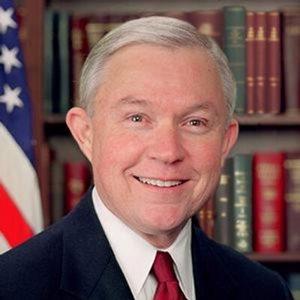
Jeff Sessions, bad cop (senate.gov)
Attorney General Sessions, for his part, was on the same page this week. In
a speech at the conservative Heritage Foundation for an event honoring Ronald Reagan's birthday, Sessions could have been channeling the Gipper himself, blaming the media, not enough drug war, and "permissive rhetoric" for problems with drug use in the US.
"We don't think illegal drug use is 'recreation,'' he said. "Lax enforcement, permissive rhetoric, and the media have undermined the essential need to say no to drug use. Don't start. That's what President Trump said to us the other day in a meeting. What did Nancy Reagan say? Just say no."
Sessions also reiterated his opposition to state-legal marijuana resorted to the discredited "gateway theory" to try to blame marijuana for the opioid epidemic.
"The DEA said that a huge percentage of heroin addictions starts with prescriptions. That may be an exaggerated number -- they had it as high as 80 percent -- we think a lot of this is starting with marijuana and other drugs," Sessions ventured.
"We are not going to pretend that there is not a law against marijuana. There is a federal law against marijuana," he said. "And we're not going to pretend that marijuana is good for you, either. I don't think it is."
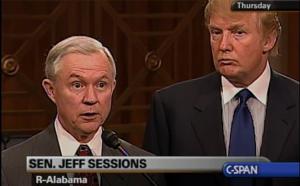
bad cops
Drug war rhetoric is one thing; actual policy shifts is another. So far, despite the tough talk, about the only concrete action aimed at driving us back to the failed drug war policies of the past is
Sessions' move last May to reverse an Obama-era policy of moving away from harsh mandatory minimum sentences in drug cases. Other than that, there's been a lot of sound and fury, but little in the way of actual policy proposals. Still, the remarks this week from the president and his chief law enforcement officer ought to be setting off alarm bells.
Meanwhile, Bernie Sanders has a better idea. The independent Vermont senator and 2016 Democratic presidential contender on Wednesday announced a petition calling on Congress to "end the failed war on drugs." "The criminal justice system is not the answer to drug abuse. Addiction is a health problem and we should start treating it that way," Sanders wrote. "While communities all across the country lack adequate resources for treatment or prevention, we are spending approximately $50 billion a year on the war on drugs. That's absurd. We need to get our priorities right."
Here is Sessions at the Heritage Foundation:
back to top
The Trump administration released its proposed Fiscal Year 2019 budget Monday, and it looks like a return to last century's failed law-and-order drug war policies. While paying lip service to the nation's opioid crisis, the administration shows its priorities by asking for more money for Trump's quixotic border wall than to actually address opioids.
In contrast with the Obama administration, which sought to tip the balance between law enforcement and treatment and prevention by tilting funding toward more counselors than cops, the Trump budget tilts back toward law enforcement.
The budget would also gut the Office of National Drug Control Policy (ONDCP, the drug czar's office), a move that is alarming mainstream critics of Trump's drug policies, but one that more radical critics of drug prohibition -- on both the left and the right -- have mixed views about.
But overall, the Trump budget is doubling down on the drug war. Here are some of its lowlights:
- The DEA gets a spending increase of $400 million, despite its legacy of obstruction, thuggery, and corruption.
- $18 million in funding over two years for the border wall, even though it won't stop the flow of drugs and even though undocumented immigration over the border is at an historic low.
- The Interagency Crime and Drug Enforcement program, an entity that coordinates federal agencies to go after drug sellers, gets a $5 million increase.
- Restored funding to the tune of $50 million for an anti-drug media campaign, a failed initiative that was zeroed out in 2012 after studies showed that the over-the-top campaigns may have actually increased drug use.
- $43 million for expanding drug courts, a misbegotten initiative where the criminal justice system pretends to have medical expertise and punishes people suffering from drug dependency for failing to get better. There is also mounting evidence that drug courts reject evidence-based approaches to treating drug use.
- A $20 million cut in the Second Chance Act, a program aimed at helping people leaving prison reenter society.
- $333 million for the Byrne Justice Assistance Grant (JAG) program. The figure is actually a slight decline from the last years of the Obama administration, but still represents hundreds of millions of dollars flowing to state and local law enforcement to incentivize drug arrests and prosecutions.
- Overall, an increase of $775 million for the Justice Department and the Department of Homeland Security for drug war efforts.
"Trump's budget proposes new funds for addressing the opioid overdose crisis, but far more money is being sought by the president to escalate the war on drugs," said Grant Smith, interim director of Drug Policy Alliance's Office of National Affairs. "We know from decades of locking people up for drugs that it doesn't work to curb drug use, but Trump's budget proposes wasting billions of dollars to do exactly that. That money would be much better spent on harm reduction and treatment interventions that actually prevent overdoses and save lives."
The Trump budget does include $900 million in increased funding for the Department of Health and Human Services to address the opioid epidemic, and it claims it would allocate a total of $13 billion to "combat the opioid epidemic," but that figure mixes treatment, prevention and war on drugs funding. And it's still less than what Trump wants to spend on his border wall.
The bright side is that the Trump FY 2019 budget is likely dead on arrival. It's a wish list, likely to be shredded and reconstructed during budget negotiations, and unlikely to look much like the proposal by the time things get done. Still, it demonstrates Trump's priorities with cold clarity.
back to top
Attorney General Jeff Sessions came out against a painstakingly cobbled-together Senate sentencing reform bill Wednesday, sparking a public food fight with Sen. Chuck Grassley (R-IA), the head of the Senate Judiciary Committee and the very face of dour Corn Belt conservatism.
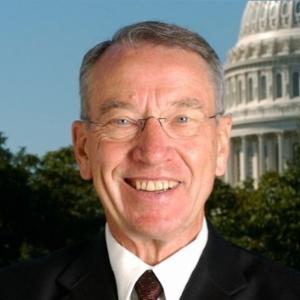
When Chuck Grassley is coming after you from the left, you know you're pretty far right. (senate.gov)
In
a letter reported by Reuters, Sessions warned the committee not to approve the sentencing reform bill,
S. 1917, claiming it would reduce sentences for "a highly dangerous cohort of criminals." Passage of the bill would be "a grave error," Sessions said.
The measure is actually a mixed bag, a product of lengthy discussions among senators seeking a compromise that could actually pass the Senate. While it has a number of progressive sentencing reform provisions, mainly aimed at nonviolent drug offenders, it also includes new mandatory minimum sentences for some crimes, including some drug offenses. Those provisions provide political cover to conservatives fearful of being tagged "soft on crime," but tired of perpetuating failed drug war policies.
Sessions has no qualms about hardline drug war policies, and his voicing opposition to the sentencing reform bill doesn't come as a shock. But Grassley, who has been shepherding the bill along for months, took it personally.
In an interview with Bloomberg Politics Wednesday afternoon, the rock-ribbed Republican ripped into Sessions, accusing him of being ungrateful after Grassley protected him from Democratic demands for public hearings on his contacts with the Russians and supported him when President Trump wanted to fire him.
"I think it's legitimate to be incensed and I resent it, because of what I've done for him. He had a tough nomination, a tough hearing in my committee," Grassley said. "They wanted to call him back every other day for additional hearings about his Russian connection, and I shut them off of that until we had the normal oversight hearing in October I believe it was, see? And the president was going to fire him, and I backed him, you know? So why wouldn't I be irritated?"
Grassley also took to Twitter to express his umbrage at his former colleague, tweeting: "Incensed by Sessions letter An attempt to undermine Grassley/Durbin/Lee BIPARTISAN criminal justice reforms This bill deserves thoughtful consideration b4 my cmte. AGs execute laws CONGRESS WRITES THEM!"
For Grassley and the bipartisan coalition attempting to move the bill forward, Sessions' intervention is little more than last-minute backstabbing. A hearing to mark up the draft bill is set for today (Thursday).
Again, that Sessions would try to derail sentencing reforms is no surprise. He helped kill a predecessor sentencing reform bill that also had broad bipartisan support when he was in the Senate. And since he has taken over as attorney general, he has pursued an undeviating conservative "law and order" agenda.
He regularly takes rhetorical aim at violent crime, illegal immigration, and drugs, and he also puts his policy where his mouth is. Last year, he crafted a memo to federal prosecutors instructing them to charge people with the most serious chargeable offense, a move designed to trigger mandatory minimum sentences. He also crafted another memo to prosecutors undoing Obama's laissez faire approach to state-legal marijuana, and he blames marijuana for fueling the opioid epidemic.
Grassley didn't attack Sessions for his draconian policy prescriptions; only for his ingratitude and what he saw as his usurpation of congressional prerogatives. Still, this battle of the dinosaurs shows how the Trump/Sessions crime agenda is creating fissures at the heart of the Republican Party.
back to top
State legislatures are in session and things are getting busy on the medical marijuana front, from CBD bills in Iowa to employment protection bills in California.
California
Last Wednesday, a bill that would provide employment protections for medical marijuana patients was filed. Assemblymen Rob Bonta (D-Oakland) and Bill Quirk (D-Hayward) have filed Assembly Bill 2069, which would "prohibit an employer from engaging in employment discrimination against a person on the basis of his or her status as, or positive drug test for cannabis by, a qualified patient or person with an identification card." The bill could get a hearing next month.
Florida
On Monday, lawmakers shamed regulators over the medical marijjuana program. A joint legislative oversight committee tore into state medical marijuana czar Christian Bax. The Joint Administrative Procedures Committee used four separate unanimous votes to clarify its displeasure with rules and regulations promulgated by the Office of Medical Marijuana Use. Lawmakers are also unhappy that the office failed to respond to more than a dozen letters from lawmakers over the past four months identifying problems with the rules.
Illinois
Last Wednesday, a bill to let opioid patients get temporary medical marijuana cards advanced. The Senate Executive Committee approved Senate Bill 336. The bill would allow people who have been prescribed opioids to apply for a temporary medical cannabis card. If passed, those prescribed opioids would be able to participate in the program if their applications are approved by the state. The background check and fingerprinting process normally required for applicants of the program would also be waived that first year because of the urgency of the crisis.
Iowa
On Monday, a new poll had overwhelming support for medical marijuana. A new Selzer & Company poll has 78% in favor of medical marijuana, with 19% opposed, figures that are roughly unchanged over the past couple of years. What has changed is support for recreational marijuana, now at 39%, up from 28% four years ago.
On Tuesday, a CBD medical marijuana expansion bill advanced.The Senate Judiciary Committee voted to approve Senate Study Bill 3106, which would grant the state Medical Cannabidiol Board the authority to broaden the definition of medicinal CBD and to expand the list of qualifying conditions to use it. The bill now heads for a Senate floor vote.
Nebraska
On Monday, a new poll had strong support for medical marijuana. A new Nebraska poll has 77% of respondents saying they would support allowing doctors to prescribe medical marijuana. Some 52% said they would definitely vote yes, while 22% would probably vote yes, and 3% were undecided but leaning toward yes. The poll comes as the legislature ponders a bill that would allow voters to weigh in on a constitutional amendment allowing medical marijuana.
New Mexico
On Monday, lawmakers rallied to support medical marijuana in the fight againt opioids. Lawmakers and supporters gathered at the state capitol in Santa Fe to urge state officials to add opioid addiction to the list of disorders qualifying for medical marijuana. And advisory panel has twice considered petitions seeking to add medical marijuana as a tool against opioid abuse, the most recent last November, but the state Health Department has yet to act.
Pennsylvania
On Tuesday, the governor announced when the first dispensary sales would begin. Gov. Tom Wolf (D) announced Tuesday that the state's first medical marijuana dispensary, in Butler County, will begin sales tomorrow. Five other dispensaries will open their doors by weeks' end, he added.
Texas
Last Thursday, the state got its first dispensary, but it's CBD only. Compassion Cultivation opened in Austin. It's the first dispensary to open under the state's CBD cannabis oil medical marijuana law. The state saw its first cannabis oil delivery to a patient earlier this week.
Utah
Last Friday, the House failed to pass a crucial medical marijuana measure. The House voted to pass one medical marijuana bill, but failed to pass a crucial companion bill. The House passed House Bill 195, allowing terminally ill patients to use medical marijuana, but then failed to pass House Bill 197, which would have actually implemented the law by instructing the state Department of Agriculture and Food to write rules on growing marijuana and contract with a third party grower to grow the plant. "One is dependent on the other," said the bills' sponsor, Rep. Brad Daw (R-Orem), who is now second-guessing his decision to file the two bills separately. "Maybe it was the wrong policy, maybe it was the wrong decision." Meanwhile, a campaign to put a medical marijuana initiative before the voters in December is well underway.
On Tuesday, the House revived and passed a crucual medical marijuana bill. Just days after it killed House Bill 197, the House brought it back and passed it Tuesday. The bill was part of a two-bill package aimed at creating a viable medical marijuana program in the state. The other bill in the package, House Bill 195, was approved last week.
[For extensive information about the medical marijuana debate, presented in a neutral format, visit MedicalMarijuana.ProCon.org.]
back to top
A massive Baltimore corruption case comes to an end, a former Homeland Security agent heads to prison for taking bribes from a Cali cartel capo, and more. Let's get to it:
In Hogansville, Georgia,
a Hogansville police officer was arrested last Monday after he was caught red-handed in an apparent drug deal. Daniel-Cameron William Kemp, 23, was spotted passing a gun and a container to a man in a car. When deputies pulled over the vehicle, they smelled marijuana, and the driver admitted buying a weapon and some weed from Kemp, adding that he'd bought drugs from him before. Police also found marijuana in Kemp's squad car. It's not clear what the precise charges are.
In Baltimore, two members of the Baltimore Police Gun Trace Task Force were convicted Monday of robbing citizens behind the protection of their badges and claiming massive overtime for unworked hours. Six other members of the squad had already pleaded guilty in the broad-ranging corruption scandal before Detectives Daniel T. Hersl, 48, and Marcus R. Taylor, 31, were found guilty of racketeering, racketeering conspiracy and robbery. Squad members specialized in robbing drug dealers of both cash and drugs.
In Miami, a former federal Homeland Security agent was sentenced last Friday to three years in prison for taking bribes from a Colombian drug lord. Christopher Ciccione II, 52, admitted taking $18,000 in cash, prostitutes, restaurant meals, and hotel rooms in return for getting Cali cartel boss Jose Bayron Piedrahita removed from a cocaine smuggling indictment. He pleaded guilty to a conspiracy of "deceit, craft, and trickery" against the US government.
back to top
Israeli Prime Minister says he barred medical marijuana exports because of Donald Trump, the International Criminal Court begins a "preliminary examination" of the Philippines' bloody drug war, and more.
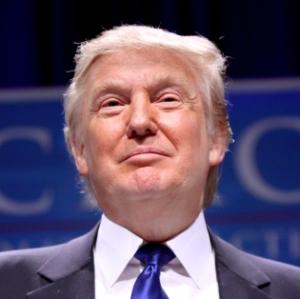
Israeli PM Netanyahu says he barred medical marijuana exports at Trump's request. (Gage Skidmore/Wikimedia)
Florida Lawmakers Shame Regulators Over Medical Marijuana Program. A joint legislative oversight committee tore into state medical marijuana czar Christian Bax on Monday. The Joint Administrative Procedures Committee used four separate unanimous votes to clarify its displeasure with rules and regulations promulgated by the Office of Medical Marijuana Use. Lawmakers are also unhappy that the office failed to respond to more than a dozen letters from lawmakers over the past four months identifying problems with the rules.
Nebraska Poll Has Strong Support for Medical Marijuana. A new Nebraska poll has 77% of respondents saying they would support allowing doctors to prescribe medical marijuana. Some 52% said they would definitely vote yes, while 22% would probably vote yes, and 3% were undecided but leaning toward yes. The poll comes as the legislature ponders a bill that would allow voters to weigh in on a constitutional amendment allowing medical marijuana.
Texas Sees First Dispensary, But CBD Only. Compassion Cultivation opened Thursday in Austin. It's the first dispensary to open under the state's CBD cannabis oil medical marijuana law. The state saw its first cannabis oil delivery to a patient earlier this week.
Harm Reduction
Iowa Needle Exchange Bill Advances. A three-member panel of the Senate Judiciary Committee voted unanimously Wednesday to approve a bill that would legalize needle exchanges in the state. Senate File 219 now heads for a vote of the whole committee.
San Francisco Regulators Back Safe Injection Site. The city's Health Commission voted unanimously Tuesday to approve a resolution supporting supervised injection services. The resolution endorses the recommendations of the Safe Injection Services Task Force, which calls for safe injection sites in the city. The matter does not need to go before the Board of Supervisors. The first two supervised injection sites could open as soon as July 1, Health Director Barbara Garcia said.
International
International Criminal Court Begins Moving on Philippines Drug War Complaints. The ICC has begun "preliminary examinations" to determine whether there is sufficient evidence to establish a case before the court in connections with the thousands of killings perpetrated in the course of President Rodrigo Duterte's bloody war on drugs. The preliminary examination is the first step in the ICC prosecution process. Duterte said he welcomed the examination because he is "sick and tired of being accused," a spokesman said.
Israel Put Hold on Medical Marijuana Exports Because of Trump, Netanyahu Says. The Israeli prime minister said President Trump called him and expressed his objection to marijuana exports. Netanyahu nixed exports earlier this week, putting potential export earnings of $1 to $4 billion a year at risk.
Lesotho Becomes First African Nation to Allow Legal Marijuana Cultivation. Lesotho has granted the first licenses for commercial marijuana cultivation, but the licenses are restricted to two foreign-owned companies. On Tuesday, Corix Bioscience announced that it received "the first license issued by the Government of Lesotho that enables them to import and export cannabis and cannabis resin in various forms." The product would be exported to any country that permits it.
back to top
A Bernie Sanders petition calls for marijuana legalization and an end to the drug war, a Dutch bank gets hit with a massive fine for cartel money laundering, New York's governor takes flak from drug reform groups on a couple of fronts, and more.

Bernie Sanders launches a petition calling for marijuana legalization and end to the drug war. (Wikimedia)
Bernie Sanders Petition Asks Congress to Legalize Marijuana. Sen. Bernie Sanders (I-VT) has sent out an online petition to his email list subscribers asking Congress to legalize marijuana and "end the war on drugs." In 2015, Sanders filed the first ever marijuana legalization bill in Congress. Even though the petition is unlikely to lead to any results while Republicans control the Congress, it will help Sanders burnish his credentials as a leader of the progressive wing of the Democratic Party.
Arizona Legalization Bill Filed. Reps. Mark Cardenas (D-Phoenix) and Todd Clodfelter (R-Tucson) filed a marijuana legalization bill Thursday. HCR 2037 would legalize the possession of up to an ounce of pot, allow for the cultivation of up to six plants, and create a system of taxed and regulated marijuana production and sales. Voters narrowly rejected a legalization initiative there in 2016.
New Jersey Legalization Hearing Set for Next Month. Assemblyman Joseph Danielsen (D-Somerset), chairman of the Assembly Regulatory Oversight and Reform and Federal Relations Committee, said Thursday the committee will hold a hearing on marijuana legalization on March 5. Gov. Phil Murphy (D) campaigned on marijuana legalization and reiterated that pledge during his inaugural address last month.
Seattle to Expunge Past Marijuana Convictions. Following the lead of San Francisco, Seattle Mayor Jenny Durkan said Thursday the city is moving to automatically clear past misdemeanor convictions for marijuana possession. "For thousands of people in Washington state, a misdemeanor marijuana conviction had huge implications: It could be a barrier to housing, to getting credit, to getting good jobs and education," Mayor Jenny Durkan told a news conference. "It is a necessary step to right the wrongs of what was a failed war on drugs." Voters in Washington state approved marijuana legalization in 2012.
Medical Marijuana
Illinois Bill to Let People Prescribed Opioids Get Temporary Medical Marijuana Cards Advances. The Senate Executive Committee approved Senate Bill 336 on Wednesday. The bill would allow people who have been prescribed opioids to apply for a temporary medical cannabis card. If passed, those prescribed opioids would be able to participate in the program if their applications are approved by the state. The background check and fingerprinting process normally required for applicants of the program would also be waived that first year because of the urgency of the crisis.
Heroin and Prescription Opioids
New York Drug Reform, Harm Reduction Groups Criticize Governor's Move to Stiffen Fentanyl Analog Penalties. The Harm Reduction Coalition, the Drug Policy Alliance, and VOCAL-NY are among the organizations calling out Gov. Andrew Cuomo (D) over his move to add 11 fentanyl analogs to the state's controlled substances schedule, a change that would increase the number of fentanyl varieties that would garner top felony charges. "The governor boasts about giving law enforcement the tools they need to make more arrests, but says nothing about providing people at risk of overdose the tools they need to survive," Daniel Raymond of the Harm Reduction Coalition said Thursday. "We won't end the overdose crisis by filling up jail cells."
New Synthetic Substances
New York Drug Reform Groups Criticize Governor's Move to Further Criminalize Synthetic Cannabinoids. The Manhattan-based Drug Policy Alliance and the drug user group VOCAL-NY are opposing Gov. Andrew Cuomo's (D) call to further criminalize the sale of synthetic cannabinoids, also referred to as "synthetic marijuana" or "K2." Such laws do little to curb use, do nothing to increase public health and safety in New York State, and undermine the ability of the state to effectively prevent minors from obtaining the substances, the groups said. The state should just legalize marijuana instead, the groups said.
International
Dutch Bank Hit With $369 Million Fine for Laundering Mexico Drug Cartel Money. The Dutch bank Rabobank has been fined $369 million by the US government after it admitted handling millions in illicit funds, the Justice Department announced Wednesday. The bank also pleaded guilty to obstructing the investigation in trying to avoid repeating sanctions imposed on it in 2006 and 2008 for "nearly identical failures," DOJ said. "When Rabobank learned that substantial numbers of its customers' transactions were indicative of international narcotics trafficking, organized crime, and money laundering activities, it chose to look the other way and to cover up deficiencies in its anti-money laundering program," Acting Assistant Attorney General John Cronan said. A former Rabobank vice president, George Martin, entered into a deferred prosecution agreement with the US concerning his role in the case, according to the DOJ. He admitted -- in a federal court in San Diego in December -- to playing a role in setting up the policies that prevented additional controls. The bank will also have to pay a $50 million penalty to the Office of the Comptroller of the Currency.
back to top
Good marijuana polling in Florida and New York, record marijuana sales in Colorado, the White House nominates a new drug czar, Purdue Pharma makes a big announcement, and more.
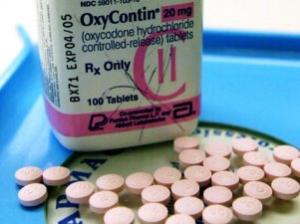
Purdue Pharma, the manufacturer of Oxycontin says it will no longer market its opioid products to doctors. (Wikimedia.org)
Sessions Slams Colorado GOP Senator in Fight Over Marijuana. Sen. Cory Gardner (R-CO) has been sticking up for his state by blocking Department of Justice nominees from consideration until Attorney General Sessions backs away from his decision to rescind Obama-era guidance to prosecutors allowing states to generally implement marijuana legalization without federal interference. And Jeff Sessions doesn't like it. He went after Gardner -- without mentioning his name -- in a speech at the National Sheriffs' Association Monday. "Too often, we've seen bad judgements, even politics enter into the work that we do," Sessions complained. "We're trying to confirm a number of important component heads at the Department of Justice. It's just getting to be frustrating, I've gotta tell you. Our nominee to the National Security Division -- the anti-terrorism division -- was approved unanimously in the committee. But because right now one senator's concerns over unrelated issues -- like reversing federal law against marijuana -- we can't even get a vote."
Colorado Sold a Billion and Half Dollars' Worth of Marijuana Last Year. It was a record-breaking year for the Rocky Mountain State. The Department of Revenue reported last Friday that legal marijuana sales topped $1.51 billion last year, with $1.09 billion coming from adult use sales and $416.52 million coming from medical marijuana sales. Those sales generated more than $247 million in taxes and fees for the state.
Florida Poll Has Healthy Majority for Legalization. A new poll from the University of North Florida finds that 62% of registered voters would back a state law regulating marijuana like alcohol, and 45% said they would "strongly support" such a law. The poll comes weeks after backers of a legalization initiative in the state conceded they did not have enough signatures to qualify for the ballot.
Massachusetts DAs Want Licenses Delayed for Cannabis Cafes, Delivery Services. In a letter last Friday to the Cannabis Control Commission, the Massachusetts District Attorneys Association called on the commission to hold off on issuing licenses for cannabis social clubs and delivery services. "We have security concerns for these businesses, their employees and their customers," the prosecutors wrote. "Moreover, these businesses heighten our concerns relative to such issues as operating under the influence, increased marijuana access by persons under the age of 21, theft and diversion to the black market." The DAs also warned that immediately licensing such businesses would be "irresponsible, ill-informed, and dangerous."
Michigan Legalization Initiative Campaign Sees Organized Opposition. A political action committee has been formed to oppose the state's legalization initiative, which is currently awaiting confirmation that it has met signature-gathering requirements to appear on the November ballot. The Healthy and Productive Michigan Committee has $150,000, courtesy of a donation from anti-legalization crusader Kevin Sabet and his group Smart Approaches to Marijuana. Sabet says there could be more money coming, too.
New York Poll Has Healthy Majority for Marijuana Legalization. A Siena College released Monday has support for marijuana legalization at 56%. The figure was 60% for New York City, 55% for downstate suburbs, and even 52% in conservative upstate. Three-quarters of voters under 35 supported legalization, while voters 55 and older were evenly split. The poll comes as Gov. Andrew Cuomo (D) is proposing a study to examine whether the state should legalize the weed.
Medical Marijuana
Utah House Fails to Pass Crucial Medical Marijuana Measure. The House last Friday voted to pass one medical marijuana bill, but failed to pass a crucial companion bill. The House passed House Bill 195, allowing terminally ill patients to use medical marijuana, but then failed to pass House Bill 197, which would have actually implemented the law by instructing the state Department of Agriculture and Food to write rules on growing marijuana and contract with a third party grower to grow the plant. "One is dependent on the other," said the bills' sponsor, Rep. Brad Daw (R-Orem), who is now second-guessing his decision to file the two bills separately. "Maybe it was the wrong policy, maybe it was the wrong decision." Meanwhile, a campaign to put a medical marijuana initiative before the voters in December is well underway.
Heroin and Prescription Opioids
Oxycontin Maker Will Quit Marketing Opioids to Doctors. Purdue Pharma, the manufacturer of Oxycontin, announced last Friday that it will stop marketing its opioid products to doctors. The move has been a key demand of numerous lawsuits blaming the company for helping to trigger the current wave of opioid misuse. Purdue said it had eliminated more than half its sales staff and will no longer send sales people to doctors' offices to discuss opioid drugs.
Drug Policy
Trump Nominates White House Staffer to Head Drug Czar's Office. The White House confirmed last Friday that White House staffer Jim Carroll has been nominated to head the Office of National Drug Control Policy (ONDCP -- the drug czar's office). Carroll has been a top aide to White House chief of staff John Kelly. Before that, he was an executive at Ford Motor Company, and before that, he was an assistant state prosecutor in Fairfax, Virginia, where he prosecuted some drug cases. He appears to have no public health experience. The drug czar's office has been empty throughout the Trump administration -- a previous nominee, Tom Marino, was forced to step down after he was linked to a bill DEA officials said limited their ability to prosecute corporate opioid cases -- and just last week, the administration once again threatened to drastically cut its budget.
International
Philippine Senator Jailed for Opposing Duterte's Drug Crackdown Calls on Him to Support ICC Probe of Drug War Deaths. Sen. Leila de Lima, who has been imprisoned for a year now on trumped up charges for opposing President Rodrigo Duterte's bloody drug war, challenged Duterte in a statement Saturday to support a probe by the International Criminal Court into "the rash of extrajudicial killings" unleashed by Philippines police. "Thousands of Filipinos are getting killed, and sadly, President Duterte remains unperturbed," said De Lima. "He chooses to ignore reports of glaring human rights violations and abuses by police and security forces who put law in their hands instead of facing the issue head-on. If he has nothing to hide, then it's high time for the President to support the independent investigation into the human rights violations and abuses incessantly happening under his regime," she added.
Britain's West Midland Police Announce Plan for Prescription Heroin, Safe Injection Sites. West Midlands Police and Crime Commissioner David Jamieson has proposed allowing the provision of medicinal heroin to users unresponsive to other treatments, as well as a panoply of harm reduction measures, including "special consumption rooms," or safe injection sites. Jamieson said he hoped to see the proposals implemented by 2020.
back to top
The proposed FY 2019 Trump budget features more drug war and cutting the drug czar's office, a legal marijuana bill gets a hearing in New Hampshire, Oregon's governor declares a public health emergency over opioids, and more.

The president's proposed budget has billions for more drug war. (Creative Commons)
Georgia Bills to Reduce Penalties Filed. A pair of bills filed in the legislature seek to reduce the criminalization of marijuana users. House Bill 865 would make possession of up to two ounces a misdemeanor. Under current law, possession of more than one ounce is a felony. Senate Bill 105 would decriminalize the possession of up to a half ounce. Legalization bills were filed earlier in the session, but they are not expected to go anywhere.
New Hampshire Legalization Bill Gets Hearing Today. The House Ways and Means Committee is holding a hearing on a limited legalization bill today. House Bill 656 would legalize the possession of up to a quarter ounce of weed and grow up to six plants, but would not set up a system of legal marijuana commerce.
Virginia Senate Approves Arrest Expungement Bill. The Senate voted 38-2 on Monday to approve Senate Bill 954, sponsored by Sen. Tommy Noment (R-James City). The bill would allow people charged with first-time possession to later pay $150 to have the charge expunged. The measure must now be approved by the House.
Medical Marijuana
Iowa Poll Has Overwhelming Support for Medical Marijuana. A new Selzer & Company poll has 78% in favor of medical marijuana, with 19% opposed, figures that are roughly unchanged over the past couple of years. What has changed is support for recreational marijuana, now at 39%, up from 28% four years ago.
New Mexico Lawmakers Eye Marijuana in Fight Against Opioids. Lawmakers and supporters gathered at the state capitol in Santa Fe Monday to urge state officials to add opioid addiction to the list of disorders qualifying for medical marijuana. And advisory panel has twice considered petitions seeking to add medical marijuana as a tool against opioid abuse, the most recent last November, but the state Health Department has yet to act.
Heroin and Prescription Opioids
Oregon Governor Declares Addiction a Public Health Crisis. Gov. Kathleen Brown (D) on Tuesday released an executive order declaring opioid addiction to be a public health crisis in the state. She said she would soon set a deadline for the state Alcohol and Drugs Policy Commission to come up with a plan to fight the problem.
Drug Policy
Trump Budget Doubles Down on Drug War. The Trump administration's proposed Fiscal Year 2019 budget is heavy on drug war spending, with an additional $400 million for the DEA, $334 million in the law enforcement-oriented Byrne Justice Assistance Grant program, $50 million for the once-discarded anti-drug media campaign, $43 million for drug courts, and a cut of $20 million in offender reentry programs. The budget includes $18 billion over two years for the Mexico border wall, which Trump justifies on both drugs and immigration grounds, which is more than the $13 billion the administration says it is allocating to fight opioid abuse.
Trump Budget Would Gut Drug Czar's Office. The Trump FY 2019 budget would also dramatically slash funding for the Office of National Drug Control Policy (ONDCP -- the drug czar's office), primarily by moving two grant programs elsewhere. Under the proposal, the Drug Free Communities Support Program and the High Intensity Drug Trafficking Areas program would be moved into the Health and Human Services Department and Justice Department, respectively. The move is opposed by some lawmakers and a coalition of more than 150 advocacy organizations, but more radical critics on both the left and the right would like to see the agency go away altogether.
Sentencing
New Jersey Governor Revives Sentencing Commission. Gov. Phil Murphy (D) is reviving the Criminal Sentencing and Disposition Commission, which was created by the legislature in 2009 to examine racial disparities in sentencing, but remained dormant under former Gov. Chris Christie (R). Christie never appointed any members to the commission. "We can and must do better," Murphy said in a statement. "A Criminal Sentencing and Disposition Commission can undertake the important review of our sentencing laws and recommend reforms necessary to ensure a stronger, fairer, and more just state." Murphy has already appointed two people to the commission's 13-member board, which must issue a report within a year of its first meeting.
back to top
A legal challenge to marijuana's Schedule I status gets a hearing, some 18 senators call for protections for state-legal marijuana, Berkeley becomes a marijuana sanctuary city, and more.
Marijuana Policy
>
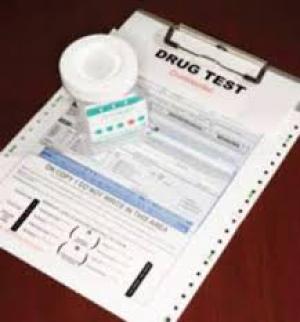
Looking for Medicaid? You'd have to pass a drug screen first under an Iowa bill. (Wikimedia)
. A lawsuit challenging the placement of marijuana in Schedule I of the Controlled Substances Act was being heard in federal court in New York City Wednesday. The suit names Attorney General Jeff Sessions and the DEA as defendants. Legal efforts to force the de- or rescheduling of marijuana have been underway since the 1970s; none have worked so far.
Bipartisan Group of Senators Call for Protections for State-Legal Marijuana. A bipartisan group of 18 senators sent a letter Tuesday to Senate Appropriations Committee Chair Thad Cochran (R-MS) and Vice Chair Patrick Leahy (D-VT) calling for protections for state-legal marijuana to be inserted into federal budget bills. "Doing so will provide the opportunity to pursue federal legislation that both protects the legitimate federal interests at stake and respects the will of the states -- both those that have liberalized their marijuana laws and those that have not," the letter said. The senators want language similar to the House's Rohrabacher-Blumenauer amendment inserted into Justice Department funding bills.
Berkeley Declares Itself a Marijuana Sanctuary City. The city council voted Tuesday to designate Berkeley as a "sanctuary city" for marijuana users. With that vote, city agencies and employees are now barred from providing information about legal marijuana use by adults or from helping to enforce federal marijuana laws. "I believe we can balance public safety and resisting the Trump administration," Mayor Jesse Arreguin (D) said at the council meeting Tuesday. "We're keeping with the strong position Berkeley is a sanctuary for people in our community."
St. Louis Aldermen Debate Lessening Pot Penalties. The city's governing body held a hearing on Alderwoman Megan Green's proposal to bar the city from expending resources to enforce marijuana laws. Public comment was overwhelmingly in favor, but some of Green's colleagues were less than enthused. No vote was taken.
Medical Marijuana
California Bill Would Provide Employment Protections for Medical Marijuana Patients. Assemblymen Rob Bonta (D-Oakland) and Bill Quirk (D-Hayward) have filed Assembly Bill 2069, which would "prohibit an employer from engaging in employment discrimination against a person on the basis of his or her status as, or positive drug test for cannabis by, a qualified patient or person with an identification card." The bill could get a hearing next month.
Iowa CBD Medical Marijuana Expansion Bill Advances. The Senate Judiciary Committee voted Tuesday to approve Senate Study Bill 3106, which would grant the state Medical Cannabidiol Board the authority to broaden the definition of medicinal CBD and to expand the list of qualifying conditions to use it. The bill now heads for a Senate floor vote.
Pennsylvania's First Dispensary Sales Begin Thursday. Gov. Tom Wolf (D) announced Tuesday that the state's first medical marijuana dispensary, in Butler County, will begin sales tomorrow. Five other dispensaries will open their doors by weeks' end, he added.
Utah House Revives, Passes Medical Marijuana Bill. Just days after it killed House Bill 197, the House brought it back and passed it Tuesday. The bill was part of a two-bill package aimed at creating a viable medical marijuana program in the state. The other bill in the package, House Bill 195, was approved last week.
Drug Testing
Iowa Bill Would Mandate Medicaid Drug Screens, Tests. Sen. Tom Greene (R-Burlington), who rode the Trump wave to office last year, has introduced Senate File 2158, which would impose special requirements on Medicaid recipients, including a requirement that if drug use is suspected, they "shall agree to participate in testing for illegal drugs."
back to top













